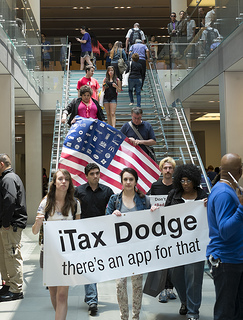
Last year the remnant of the Chicago Tribune requested ideas for elements of a new “Plan of Chicago.” They even posted a few of the responses on their site. I suppose some were included in the hardcopy newspaper too. But those don’t seem to have included my submission, so I probably ought to post it here.
My proposal, of course, relates to how public revenue is raised. The protesters pictured on the right probably wouldn’t realize that it relates to their concerns, and would almost certainly cause Apple to make a greater contribution to local coffers than they do now. But it wouldn’t increase any corporate tax rate nor prevent Apple from playing accounting games. It doesn’t need to.
Here’s the proposal as submitted on October 24 2013:
PLAN of CHICAGO proposal:
Chicago-area governments are in financial difficulty. Accordingly, they are raising existing taxes, and finding new things to tax. One result is a declining amount of jobs, as entrepreneurs and other employers look elsewhere, and middle-income people move away. We need to change the way we raise revenue, to do it in a way that encourages, rather than discourages, economic opportunity.
One resource that Chicago has plenty of is land. Vacant land throughout much of the south and west sides, and scattered parcels even in the most desired neighborhoods. Why is this land not put into use for homes, factories, offices, and other productive work? Each vacant lot has its own story, but in general, the problem is that the cost to buy the site, build and operate any kind of improvement exceeds the anticipated value it could produce. So, how could we reduce the cost, or increase the value, and get sites developed, while increasing public revenue and/or reducing public expense?
Buried in our traditional “property tax” is one tax which can be raised without discouraging economic development.
Property owners know that their tax is based on the assessed value of their property, and the assessment notices they receive show this consists of two parts: value of land and value of improvement. ( For vacant lots, of course, the value of improvement is zero.) What I propose is that we tax the land value portion higher than the improvement portion. If this is done in a revenue-neutral way, the tax burden for most owners of homes and businesses will be reduced, while the tax paid by owners of vacant lots will increase.
No matter how high the tax on land value is raised, owners of vacant lots can never move these lots out of the city. Probably they’ll sell their land, making land more available for people who really intend to use it for some productive purpose. By raising the tax on land value, we actually make the selling price cheaper. But, more important, by lowering the tax on the improvement we actually make it cheaper to build and maintain houses, offices, stores, factories, and other types of structures.
This is approximately what some Pennsylvania cities have been doing, and back in 1983 Fortune magazine published an article about it, entitled “Higher Taxes that Promote Development.” Back then, five cities had shifted some taxes onto land value. As of 2013, there are 13 cities, 2 school districts, and 2 other districts using this technique.
Experience with this reform has been generally good, but some difficulties occur due to failure in Pennsylvania to maintain good, up-to-date assessments. In this respect, Illinois would have an advantage, as our assessments are kept fairly current. Also, unlike other taxes, real estate taxes and assessments are public record, helping to keep corruption under control. And we needn’t limit the taxes to fee ownership. Why not impose a tax on the privilege of controlling street parking, reclaiming for the City some of what the Mayor gave to private investors a few years ago?
Furthermore, we could use an increased land value tax as an alternative to raising sales taxes or other job-destroying taxes. In Pennsylvania, some of the increases in land value tax were used to avoid increasing the wage tax which some cities in that state impose.
In summary, this proposal would increase the net return to almost any productive activity, while likely reducing the selling price of the sites which such activity requires. The resulting increase in jobs and entrepreneurial opportunity will reduce the burden of poverty on the community and local governments.
It isn’t the complete solution to Chicago’s problems, but it would help make other solutions workable.